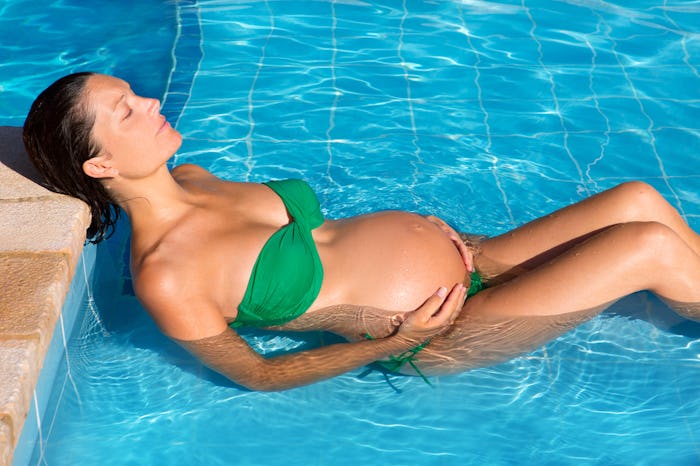Summer

The Sneaky Skin Problem You Forget About During Pregnancy
Grab that mineral sunscreen!
Pregnancy can do a lot of strange things to your body. From the most unexpected food cravings to pregnancy rhinitis (basically constant congestion) to zero hair growth on your arms and legs, the possible pregnancy symptoms out there seem endless. So it doesn’t seem like too much of a stretch to assume that it also affects your skin. You might have heard that carrying a child can make your skin more sensitive, so anyone who spends a lot of time outside and is going to be pregnant during the summer might wonder if pregnancy can make you more susceptible to a sunburn.
It’s definitely a valid concern — who really wants a sunburn on top of being pregnant? You’re already uncomfortable enough with the aches and pains that come along with your new belly. The last thing you need is to add more discomfort with burning skin. To find out if you need to be extra careful while sunbathing (or if you should skip the sunbathing altogether), I reached out to some experts.
Is your skin more sensitive during pregnancy?
The rumors are true: your skin is indeed more sensitive when your body is making a baby. Clinical and aesthetic dermatologist Dr. Harshal Ranglani, MD, tells Romper that this is due to the immunological balance of the body, which is altered to allow the fetus to better attach to the mother. “This immunological change occurs as a whole, extending to the skin as well,” she notes. “This change in the immune profile of the skin makes it more sensitive.” If you’ve noticed that certain skin conditions get worse or appear out of nowhere when you’re pregnant, this is the reason why.
Can pregnancy make you more susceptible to sunburns?
If your skin tends to be more sensitive during pregnancy, then it makes sense that you might be more susceptible to sunburn. And, according to Ranglani, this is true. “Recent studies have shown that the structure of the natural barrier of the skin is altered during pregnancy,” she says. “This, along with alterations in the immune system, work together to weaken the immune and physical barriers of the skin during pregnancy. The skin’s normal blood flow also increases during this time. Additionally, the increase in progesterone also makes the skin more sensitive. All these together can increase the risk of sunburn.”
However, Dr. Susan Massick, board-certified dermatologist at The Ohio State University Wexner Medical Center, says that while your skin is not necessarily more sensitive during pregnancy or more susceptible to sunburn during pregnancy, you are more likely to see other side effects from the sun. “You may be more susceptible to developing chloasma, or the mask of sunscreen with pregnancy and UV exposure,” she says. “It causes dark patches on the face, particularly the forehead and cheeks stimulated by the hormonal changes of pregnancy and sun exposure.”
Is it safe to be in the sun during pregnancy?
No matter how great it might feel to lay in the sun, at the end of the day, you probably want to do what’s best for the baby. The good news is that you don’t need to avoid sunbathing completely, but you should definitely be more cautious about it. Massick says that while it’s OK to sunbathe while pregnant, it should be in moderation. Not only should you be careful of a sunburn, but it’s also extremely easy to get overheated and dehydrated when you’re expecting. “Be aware of how long you’ve been out in the sun, how hot or overheated you may feel, and whether you’ve been staying hydrated with the potential effects to the baby in regards to heatstroke and dehydration,” she advises.
She also points out that, pregnancy aside, sunbathing has its fair share of risks, like premature aging and skin cancer. Ranglani has similar advice, and recommends that pregnant women avoid sunbathing for long periods of time. If you are going to be in the sun for a while, chug that water bottle!
How to protect your skin from the sun during pregnancy
The number one way to protect your skin when you’re in the sun, pregnant or not, is to liberally apply sunscreen every two to three hours. Of course, even the simple act of picking a sunscreen can feel tricky when you’re pregnant — you may have heard that you should avoid certain ingredients.
Ranglani recommends using pregnancy-safe sunscreen, which she defines as anything made with inorganic or physical filters. Look for mineral sunscreens made with zinc oxide and titanium dioxide, and avoid anything made with chemical or organic filters. “Not only can they irritate the skin, but they are also absorbed into the skin,” she points out. “The full effect of these is yet to be ascertained in human skin. However, a chemical filter called avobenzone has been known to cause hormonal changes, being an andocrine-disrupting chemical in mice.”
Massick says basically the same thing, echoing that mineral sunscreens are much less likely to cause a rash or skin irritation the way chemical sunscreens do. “These ingredients are better for the environment in general and fine to use during pregnancy,” she says. “These sunscreens act as physical blockers, causing the sun rays to reflect off your skin.” She also recommends wearing UPF clothing and avoiding the intensely high UV rays between 12 p.m. and 2 p.m. each day.
Experts:
Dr. Susan Massick, board-certified dermatologist at The Ohio State University Wexner Medical Center
This article was originally published on